THE EIGHTH INTERNATIONAL KIERKEGAARD CONFERENCE
The Hong Kierkegaard Library hosted the Eighth International Kierkegaard Conference during the Summer of 2018. The topic: “The Wisdom of Kierkegaard: What Existential Lessons have you Learned from Him?” For additional information please refer to the Conference Program published by the Hong Kierkegaard Library.
An International Hub of Kierkegaard Scholarship – On Wednesday, June 13th of 2018, the Eight International Kierkegaard Conference began with an Opening Dinner and Plenary Lecture in one of the on-campus ballrooms. Nearly two hundred renowned Kierkegaard scholars reigning everywhere from Nigeria to Slovakia to Brazil attended the Conference.
Hong Kierkegaard Library Curator Gordon Marino and St. Olaf President David Anderson gave welcoming statements and precluded the Plenary Speaker for the night, Danish philosopher Dr. Richard Purkarthofer. Dr. Purkarthofer spoke in-depth on the physicality of Kierkegaard’s writings and, more specifically, on topic Taking a Good Punch–The Impact of Kierkegaard. In the words of Dr. Purkarthofer:
There is little disagreement that Kierkegaard’s works have enjoyed an exceptional reception and exerted a powerful influence on tendencies within theology, philosophy, literature and even in movies and music. This remarkable reception is evident in a wealth of scholarly work. However penetrating, illuminating and stimulating many of these studies might be, it is fair to wonder whether or not they might also represent ways of keeping Kierkegaard at a distance. With all due respect to the sweetness of scholarship, there might be something to be learned from the sweet science when it comes to reading Kierkegaard. That is like deft boxers perhaps we can find a way to keep Kierkegaard’s text at arm’s length and still remain close enough to absorb the punch of his challenging insights. In sparring with our friend, I will survey various approaches to Kierkegaard’s works focusing on the role of distance and closeness in assessing Kierkegaard’s response to the question: “what does it mean to be a human being?”
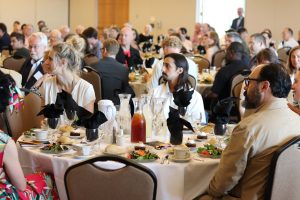
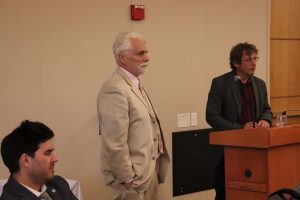
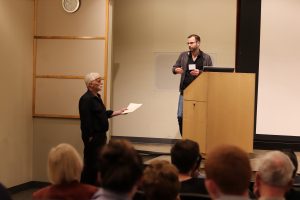 Research Paper Presentations
Research Paper Presentations
More than seventy-two Kierkegaard scholars set forth their papers in two of the College’s on-campus academic facilities, Viking Theater and the Center for Art and Dance. The topics ranging from The Courage not to Be: Kierkegaardian Reflection on Suicide and the Temerity of Joy to Kierkegaard and the Desirability of Immortality, the diversity of the speakers in these twenty-minute sessions in combination with their passion for Kierkegaard produced lively conversation after each presentation.
The Dissertation Panel took place on Thursday evening and resulted in a remarkable dialogue between seven fellow Kierkegaardian scholars, each with unique areas of interest in the multifaceted field of existentialism. A Fellow of the Kierkegaard House Foundation 2017-2018, Andrés Roberto Albertsen initiated the Panel with the topic of Love and Politics: A Convergent Reading of Hegel’s Philosophy of Right and Kierkegaard’s Works of Love. The following six panelists (Ruby Guyatt, Paulo Henrique Lopes, Tomer Raudanski, Valérie Roberge, Troy Wellington Smith, and Fernanda Winter) each illuminated new perspectives on the works of Kierkegaard. It was a remarkable evening.
The Paper Presentations continued through Friday the 15th and well into Saturday. The Kierkegaard & The Tango of Life session highlighted Friday evening and the coordinator of the session, Claus Damgaard, describes the event not as a tango-class for beginners but rather as an “indirect attempt to share with you — through primitive experience — one of the main lessons I keep receiving from Kierkegaard.”
Saturday the 16th ended on a more somber note. In the College’s Heritage Room many of the scholars gathered to share memories of Robert Perkins, a beloved Kierkegaard scholar whose prolific works have left a lasting impact. The Memorial Gathering lasted an hour and provided a reprieve from the excitement of the past few days.
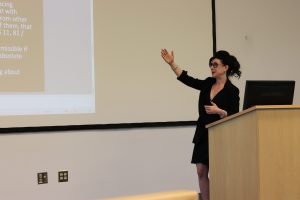 The Spanish & Portuguese Presentations
The Spanish & Portuguese Presentations
These sessions showcased Kierkegaardian scholars who wished to present a paper about the existential lesson they had learned from Kierkegaard in either the Spanish or Portuguese language. Featuring scholars who came from all around the world — Italy, Mexico, Argentina, Texas, Portugal, to name a few — each session gave excellent presentations on topics such as La contemporaneidad como concepto dialéctico respecto al tiempo and A possibilidade de viver una existência experimentante. Providing a great opportunity for all scholars to reflect on the Danish scholar in a different setting than the typical presentation done in English in the lecture halls, the Spanish and Portuguese Presentations were an unforgettable experience.
After the Spanish and Portuguese presentation sessions finished, the Translation Seminar began with the participation of Kierkegaardian translation specialists present in-person or online. This seminar-style session offered a space for scholars to share their own experiences, materials, resources, ideas, difficulties, proposals, and the latest news in the world of Spanish and Portuguese existentialist translations. Zoom, a video-conference program, allowed for the opportunity to bring in guests from all around the world. Together, the scholars considered several concrete translation cases and discussed the specific semantic and grammatical challenges associated with each case. The Translation Seminar proved both an informative and exciting end to the Conference’s academic sessions.
Closing Lunch in Valhalla dining Hall
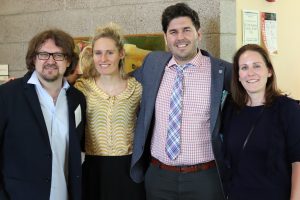
The lunch was a cheerful event filled with celebration and, of course, many conversations about the enigmatic 19th-century Danish philosopher. The week was over and the flurry of Conference activities finally began to slow. The goodbyes that followed the Closing Lunch were bittersweet. The Conference brought together hundreds of international Kierkegaardian scholars and gave them the opportunity to unite and share ideas as a community at one of the largest collections of Kierkegaard’s works in the world.
The Conference took place across the campus of St. Olaf College, one of the nation’s leading liberal arts institutions. Similarly committed to global education, more than 70% of St. Olaf students participate in off-campus study programs. St. Olaf President David Anderson observes that these diverse learning opportunities St. Olaf College offers work together to provide all students with “the base of knowledge, skills and proficiencies, experiences, and habits of mind and heart that will enable them to flourish in whatever future awaits them.” Combining rigorous academic programs with a tight-knit community, St. Olaf College truly provides a welcoming academic environment for all learners.
For more information and exclusive event photos, check out our Hong Kierkegaard Library Facebook page.
You must be logged in to post a comment.